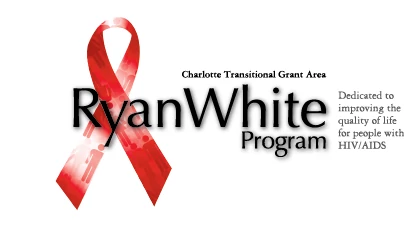Ryan White Program
The Goal of HIV Care
The Ryan White HIV/AIDS Program funds medical and support services for people living with HIV who are uninsured or underinsured and have income at or below 500% of the Federal Poverty Level, regardless of a person's ability to pay. All funded services support the HIV Care Continuum - the series of steps a person with HIV takes from initial diagnosis through their successful treatment with HIV medication:
- Diagnosed with HIV
- Linked to care
- Engaged or retained in care
- Prescribed Antiretroviral Therapy
- Achieved viral suppression

How to Get Services
A person enrolled in Part A services must meet the following eligibility:
- Is HIV-positive
- Lives in Anson, Cabarrus, Gaston, Mecklenburg, Union (NC), or York (SC) County
- Is at or below 500% of the Federal Poverty Level, for example a single household of 1 making $78,250 or less would qualify
How to enroll:
- Find a service provider in the service provider listing (Ryan White Subrecipients) below.
- Call the provider of your choice and schedule an appointment.
- Bring to your first appointment:
- Proof of HIV status,
- Proof of income, if any (most recent W2, last month worth of paystubs, or SSI/SSDI statement),
- Proof of residency (NC or SC state ID, utility bill with your current address on it, or leasing agreement), and
- Insurance/Medicaid/Medicare card (if any).
Questions? View our Client Eligibility Form.
Need help finding the right service for you? Contact one of our Linkage to Care Specialists at 704-432-8378.
Available Services
As new HIV diagnoses increase, people living with HIV age, and HIV disproportionately affects special populations, we believe it is important to provide services that treat the whole person. The Charlotte TGA Ryan White Part A Program currently funds the following services:
- Early intervention services
- Emergency financial assistance
- Foodbank / home-delivered meals
- Health insurance premium & cost-sharing assistance
- Housing services
- Linguistic services
- Medical case management
- Medical transportation
- Mental health
- Oral health care
- Outpatient / ambulatory health services
- Psychosocial support
- Referral for healthcare and support services
Family Size / Federal Poverty Level 2025
Effective March 1, 2025, income eligibility range is at or below 500% of Federal Poverty Level. Income is based on gross family income before deductions.
Persons in Family or household | |||||||||
|---|---|---|---|---|---|---|---|---|---|
| % of Poverty | 1 | 2 | 3 | 4 | 5 | 6 | 7 | 8 | Each Add. Person |
| 100% | $15,650 | $21,150 | $26,650 | $32,150 | $37,650 | $43,150 | $48,650 | $54,150 | $5,500 |
| 138% | $21,597 | $29,187 | $36,777 | $44,367 | $51,957 | $59,547 | $67,137 | $74,727 | $7,590 |
| 150% | $23,475 | $31,725 | $39,975 | $48,225 | $56,475 | $64,725 | $72,975 | $81,225 | $8,250 |
| 200% | $31,300 | $42,300 | $53,300 | $64,300 | $75,300 | $86,300 | $97,300 | $108,300 | $11,000 |
| 250% | $39,125 | $52,875 | $66,625 | $80,375 | $94,125 | $107,875 | $121,625 | $135,375 | $13,750 |
| 300% | $46,950 | $63,450 | $79,950 | $96,450 | $112,950 | $129,450 | $145,950 | $162,450 | $16,500 |
| 350% | $54,775 | $74,025 | $93,275 | $112,525 | $131,775 | $151,025 | $170,275 | $189,525 | $19,250 |
| 400% | $62,600 | $84,600 | $106,600 | $128,600 | $150,600 | $172,600 | $194,600 | $216,600 | $22,000 |
| 450% | $70,425 | $95,175 | $119,925 | $144,675 | $169,425 | $194,175 | $218,925 | $243,675 | $24,750 |
| 500% | $78,250 | $105,750 | $133,250 | $160,750 | $188,250 | $215,750 | $243,250 | $270,750 | $27,500 |
Want to Get Involved in HIV/AIDS Advocacy? Consider Joining the Ryan White Planning Body.
We are consumers and providers of Ryan White services, guiding the use of Ryan White Part A funds in the Charlotte Transitional Grant Area (TGA). Together, we decide how best to fund HIV health and supportive services that enhance care access and retention.
Upcoming Planning Body Events
Governing Documents
Meeting Documents
Quality Management
Our mission is to continuously improve the care and health outcomes among People Living with HIV/AIDS (PLWHA) in the Charlotte TGA.
Continuous Quality Improvement (CQI) is an ongoing process of monitoring and evaluating activities and outcomes in order to continuously improve service delivery. CQI seeks to prevent problems and to maximize the quality of care.
We strive to improve health outcomes, reduce health disparities, and increase access to and retention in care for PLWHA.
Our work isn't possible without input and expertise from Consumers (People Living with HIV) and Providers of HIV services.
Our Quality Management Volunteer Ambassadors collaborate to:
- Collect and evaluate Consumer Satisfaction surveys;
- Establish and monitor Performance Measures to support high quality HIV care;
- Set expectations for Service Standards with our partners in the Ryan White Planning Body; and
- Develop and revise the Quality Management Plan.
Quality Management Leadership
Alexis Wyatt, MSW, Quality Management Program Coordinator
- [email protected]
- 980-314-1608

